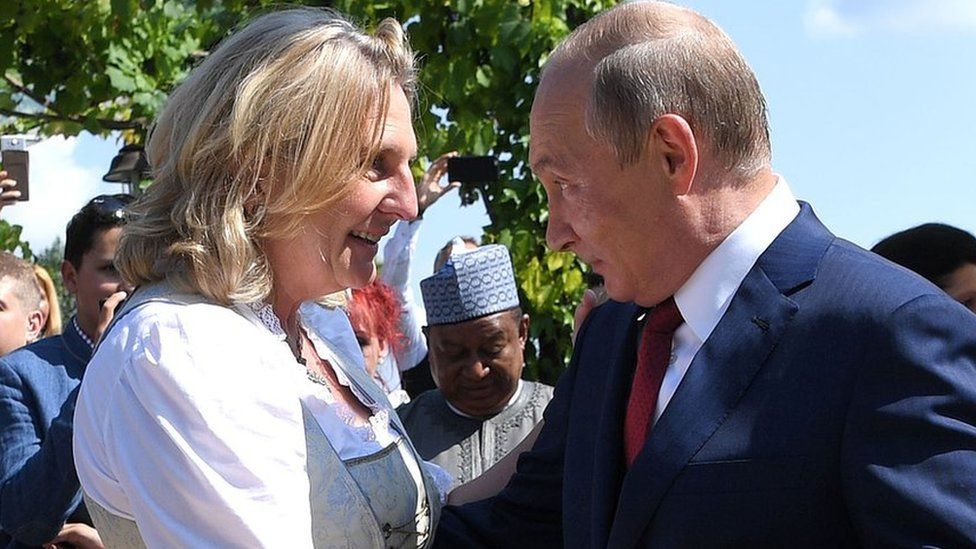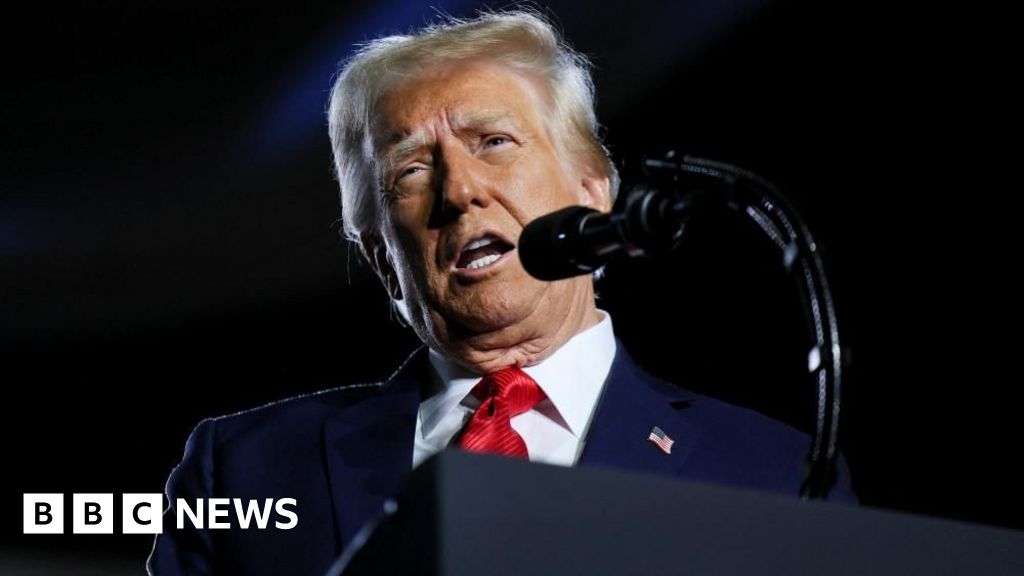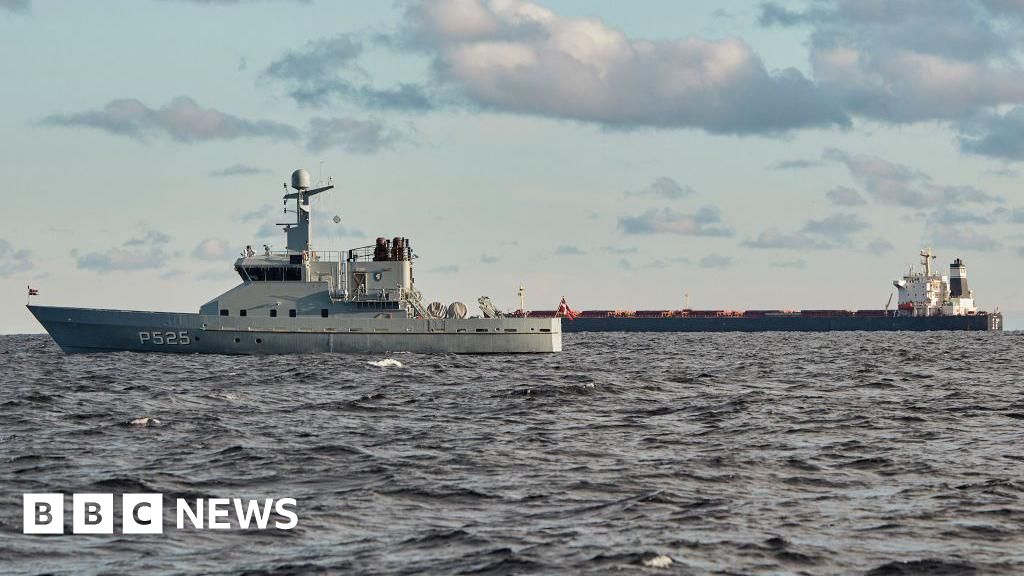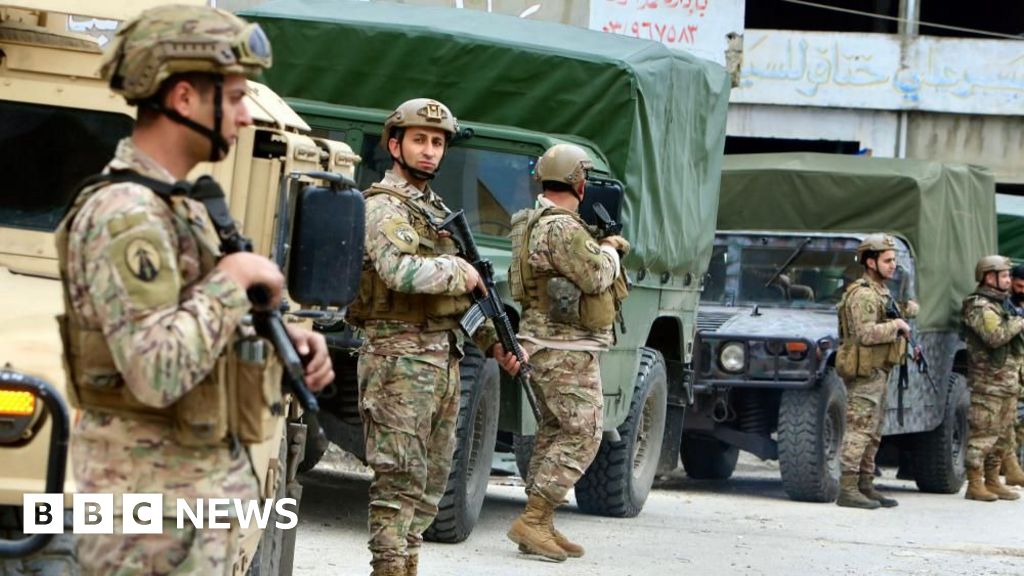ARTICLE AD BOX
 Image source, Reuters
Image source, Reuters
Vladimir Putin danced with Ms Kneissl at her wedding in 2018, and brought her a bouquet of flowers
By Steve Rosenberg
Russia Editor, St Petersburg
I'm sitting in a 19th Century St Petersburg mansion. Lying on the floor by my chair is Winston Churchill. He is fast asleep… and he is snoring.
"Maybe if you wake him up from time to time it's good."
This piece of advice comes from Austria's former Foreign Minister Karin Kneissl who's sitting opposite me. Winston Churchill is her boxer dog. A few months ago they moved to Russia, along with Ms Kneissl's cat and ponies.
"We once had a little diplomatic incident with his snoring," she recalls. "I had a telephone conversation with my German colleague. [Former German Foreign Minister Heiko] Maas was on loudspeaker and Winston Churchill snored. We had to wake him up in order not to irritate Berlin. Otherwise, they might have thought that Vienna falls asleep when Berlin calls."
Karin Kneissl has been many things: a lecturer, a freelance journalist, an energy analyst. She's also been a figure of controversy. No more so than in 2018 when Russian President Vladimir Putin attended her wedding.
For much of the 1990s she worked in the Austrian foreign ministry. In 2017 Austria's far-right Freedom Party (of which she was not a member) nominated her to be foreign minister in a new coalition government. The party had been cultivating close ties to the Kremlin and had signed a co-operation agreement with Russia's ruling party United Russia.
In 2019 the government collapsed, and Ms Kneissl left office. She claims that "political pressure" stymied her attempts to resume a career in academia and business because she was widely perceived as being too close to Russia.
BBC
He is the most intelligent gentleman... what Jane Austen wrote in Pride and Prejudice about the accomplished gentleman, [Putin] amounts to this standard
There was much her critics could point to. In 2020 Karin Kneissl began contributing opinion pieces to Russia's state-controlled media outlet RT. She became a visiting professor for the Moscow State Institute of International Relations. In 2021 the Russian oil giant, Rosneft, appointed her to its board (she resigned in May 2022).
Complaining of a "witch-hunt" and of being unable to find work at home, Karin Kneissl moved to France, then to Lebanon. A few months ago she was on the move again: this time to Russia to head an analytical centre at St Petersburg University. It's based in the exquisite mansion where I'm sitting. The organisation's website states that its mission is "to search for solutions to the challenges of global development and the tasks of Russian policy".
Ms Kneissl not only runs it. She came up with the name.
"I created the name G.O.R.K.I, which is the acronym for Geo-Political Observatory for Russia's Key Issues," Ms Kneissl tells me.
"You do understand that it's hugely controversial for a former Austrian foreign minister to move to Russia," I suggest, "at a time when this country has launched an unprovoked full-scale invasion of Ukraine? Isn't there a danger that by being here you are legitimising the invasion, the war and the domestic repression that is taking place here?"
"Well, so far I have not seen any sort of repression in my immediate surrounding," she replies. "I can work here in a kind of academic freedom which I started missing when I was still teaching at various universities in the European Union."
I remind Ms Kneissl that, only a few days ago in this very city, a young woman - Sasha Skochilenko - was sent to prison for seven years for replacing price tags in a supermarket with anti-war slogans. One recent example of the wave of repression sweeping Russia.
"So, what do I have to do with that?" she replies. "I just explained at length the situation I have been going through. Let us put the whole thing the other way: why was Karin Kneissl forbidden to work? Where is my crime? I am really grateful I have the opportunity to work [in Russia.]"
Winston Churchill interrupted his owner's interview with the BBC
Winston Churchill's snoring is growing louder. It's so loud that my TV microphone is now picking it up. I cannot let this sleeping dog lie. For the first time in my career, I'm forced to interrupt an interview to rouse a hound.
It was in 2018 that Karin Kneissl hit headlines around the world.
In March that year, a chemical nerve agent had been employed on the streets of Britain. Former Russian double agent Sergei Skripal and his daughter Yulia had been targeted with Novichok. They survived the attack in Salisbury. But a member of the public, Dawn Sturgess, was poisoned, too, and later died. The European Union had agreed with the UK government's assessment "that it is highly likely the Russian Federation is responsible." Scores of Russian diplomats were expelled from Europe. Moscow denied any connection.
Just three months later, Karin Kneissl invited President Putin to be a guest at her wedding planned for the summer. In August 2018, the Kremlin leader arrived with a bouquet of flowers, a kiss and a plethora of gifts for Ms Kneissl and her groom, including a samovar (an urn used to prepare tea in Russia), a painting and a pair of earrings. The Russian president and the Austrian foreign minister shared a waltz. At the end of the dance Ms Kneissl gave a deep curtsy.
In an interview with the BBC's HARDtalk programme earlier this year, while she was still in Lebanon, Karin Kneissl was asked whether she would dance with President Putin today at a wedding, knowing that the Kremlin leader had been indicted by the International Criminal Court as a suspected war criminal.
"Yes," she replied. "What has the one with the other thing to do? I'm not going to enter into this whole war criminal indictment because we have plenty of war criminals within high-ranking political circles."
When I raise the subject of her 2018 wedding, there is a ding dong. But it's not wedding bells.
"This is so boring," she says irritated. "The whole thing happened nearly six years ago. At the time I was foreign minister and I danced with President Putin. But I have done other things in my life before and after. Honestly, it's so boring. It's very boring."
"To talk about the wedding?"
"Yes. There are much more interesting topics we can discuss."
Image source, Kremlin
Image caption,Ms Kneissl described President Putin as "the most intelligent gentleman"
"We will. But you have no regrets?"
"I consider it boring. And the dog just fell asleep and was snoring because he knows the topic."
She's right. Winston Churchill has nodded off again. I doubt that it's the Putin wedding question that has sent him back to sleep; though I suppose we'll never know.
But I do know Karin Kneissl's opinion of Western pressure on Russia: she believes that European leaders are starting to recognise the ineffectiveness of sanctions.
"What I think is moving is the acknowledgement of many that the sanctions don't work," she tells me. "Many are having to admit that sanctions against Russia did not yield the results they wanted to have.
"And when you look at the way all EU officials have been talking for the last eighteen months - regime change in Russia is what they ask - I mean, how can you as Russia then negotiate with people who ask for your implosion, your destruction?"
I spot the pictures on the cabinet behind her. Among them is a photo of Karin Kneissl with Russia's Foreign Minister Sergei Lavrov; and a picture of her with President Putin.
"From your meetings with Vladimir Putin," I ask, "what kind of a person do you think he is?"
"He is the most intelligent gentleman, with the focus on gentleman - and I've met a few," Karin Kneissl responds. "In the sense of what Jane Austen wrote in Pride and Prejudice about the accomplished gentleman, he amounts to this standard."
Ms Kneissl has photos of her and the Russian president on display inside her office in a St Petersburg mansion
"We're seeing a wave of repression domestically and we've seen Russia invade Ukraine," I point out. "It's hard to classify this as a gentlemanly action."
"Well," she responds, "Tony Blair, David Cameron… they were all involved with their governments in military action."
Karin Kneissl is building a new life for herself in Russia. But could she imagine ever returning to Austria?
"In Austria there are a number of voices calling for my nationality to be withdrawn because I am working now at a university in Russia," she tells me. "I am accused of being corrupt, of high treason, of thirty years of KGB service, according to Wikipedia. All this kind of dirt and defamation destroys a life. And I don't want to go back to Austria until a lot of legal cases have cleared my reputation."
"You say there are people in Austria who accuse you of high treason and of being…"
"But can you understand, to an extent…?"
"No, not even to an inch. I don't understand it," she says. "It's just dirty fantasy."

 1 year ago
17
1 year ago
17








 English (US) ·
English (US) ·